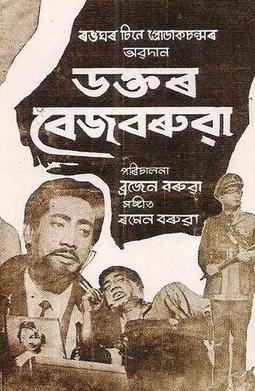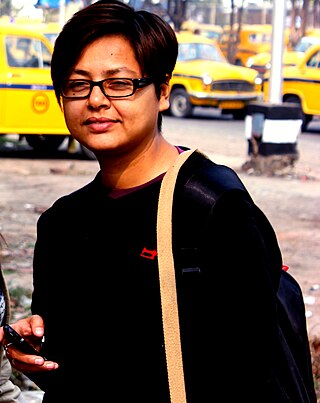Related Research Articles

Jyoti Prasad Agarwala was a noted Indian playwright, songwriter, poet, writer and film maker from Assam. He was considered as Assamese cultural icon, deeply revered for his creative vision and output and is popularly called the Rupkonwar of Assamese culture. In fact, he is regarded as the founder of Assamese cinema for Joymoti (1935). His death anniversary is observed as Silpi divas his honor.

Assamese cinema, is an Indian film industry of Assamese-language. It is based in Assam, India. The industry was born in 1935 when Jyoti Prasad Agarwala released his movie Joymoti. Since then the Assamese cinema has developed a slow-paced, sensitive style. In beginning the industry were called Jollywood, named for Agarwala's Jyoti Chitraban Film Studio.
Biju Phukan; 18 February 1947 – 22 November 2017) was an Assamese actor. He was born in Dibrugarh, India, where he studied in the Dibrugarh HS Kanoi College and Dibrugarh Govt boys' higher secondary school Dibrugarh. He appeared in more than eighty Assamese feature films. His first movie was Dr. Bezbarua (1970).
Jatin Bora is an Indian actor and director who has appeared in Assamese language films since 1989. He is also an actor and director in some mobile theatre groups of Assam, including Aabahan, Hengool, Ashirbaad, Bhagyadevi, Kohinoor, Itihas and Surjya.

Tora is an Assamese language children's film directed by Jahnu Barua and produced by the Children's Film Society, India. The film was released in 2004. The film received the Best Children's Film award in the 51st National Film Awards for the year 2003.

Kopil Bora is an Assamese actor, anchor and All India Radio voice artist. He debuted in Bidyut Chakravarty's 2002 Assamese film Gun Gun Gane Gane and known for his performance in Mon (2002), Ahir Bhairav (2008), Jetuka Pator Dore (2011) and Dwaar (2013).

Ahir Bhairav is a 2007 Indian Assamese language drama film directed by Siva Prasad Thakur and produced by Dr Ronen Sarma, under the banner of Rondeep Productions (UK) Ltd. This is the first ever Assamese movie that was entirely shot in the UK and was the Assamese's second film to be shot outside India after Hiya Diya Niya (2000). It has been chosen by the British Film Institute, London, to be preserved in its archive.

Prastuti Porasor is an actress from Assam, India. She has acted in a number of Assamese movies and stage dramas.
List of films released in Assamese cinema in the Assamese language.

Dr. Bezbarua is a 1969 Indian Assamese language thriller film, the first film of this genre in the language, directed by Brajen Barua and produced by Rangghar Cine Productions. The film was released on 7 November 1969. It was marked as the beginning of success of so-called commercial movies in Assamese Film industry. It was also first time the outdoor and indoor shooting entirely took place in various locations of Assam.

Simple Gogoi is a director from Assam, India. Her first movie is Tumi Jodi Kua and later she worked on mega serials, Ad Films and more than hundred music videos.
Joymoti is an Assamese biographical film directed by Manju Borah. It was released in the year 2006. Shooting of the film was done in Ketetong village at Margherita, Assam.Miao Arunachal Pradesh
Munin Barua was an Indian film director in Assamese cinematography. Among his best-known films are Pita-Putro, Prabhati Pokhir Gaan, Hiya Diya Niya, Daag, Nayak and Bidhata. Barua is widely regarded in Assam to have been one of the directors who helped popularize and establish Assamese cinema outside the state, primarily elsewhere in India where other industries had historically dominated. In 2000, his film Hiya Diya Niya became a first 'blockbuster hit' in Assamese cinema, which helped to revive the Assamese film industry. His another film, Dinabandhu received National Film Award for Best Feature Film in Assamese in 2005.
Nayak is a 2001 Indian Assamese romantic drama movie directed by Munin Barua and produced under the banner of Pooja Motion Pictures. Music was composed by Zubeen Garg. The film was released on 30 November 2001.
References
- ↑ "Released Assamese Films". enajori.com. Archived from the original on 8 March 2012. Retrieved 6 April 2013.
- ↑ "List of Assamese Movies (Passed by the Censor Board)". Rupaliparda.com. Archived from the original on 18 March 2014. Retrieved 7 April 2013.
- ↑ "7th National Film Awards" (PDF). Directorate of Film Festivals . Retrieved 4 September 2011.